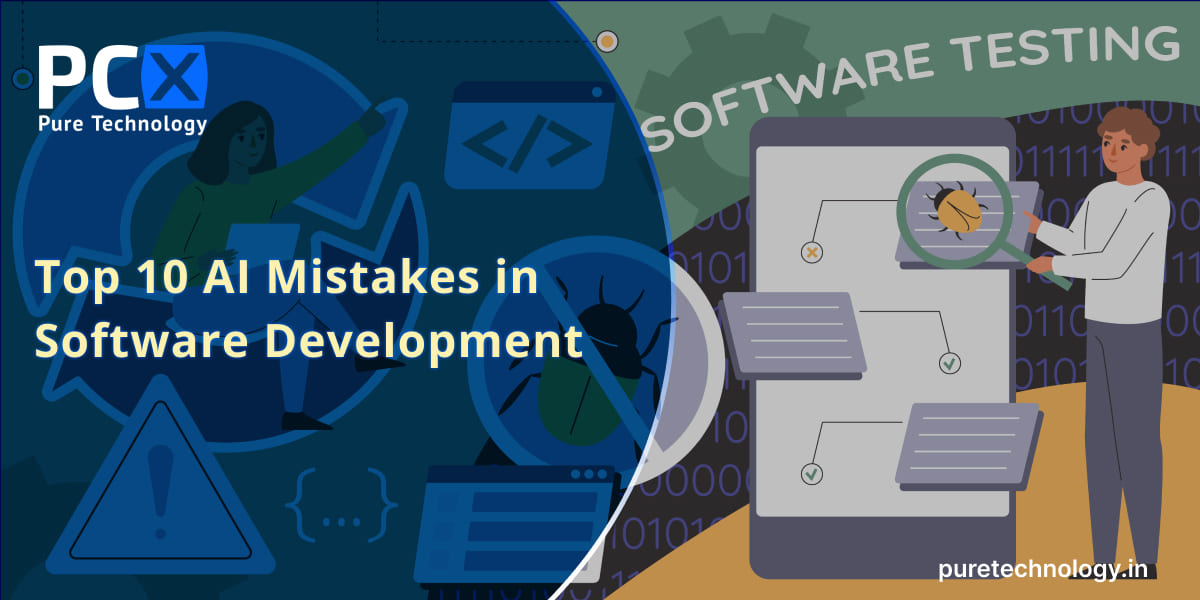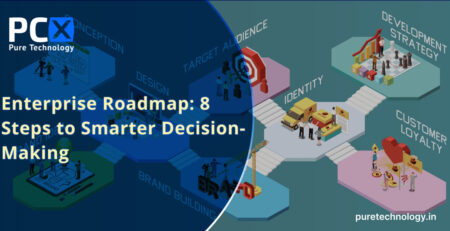Top 10 AI Mistakes in Software Development
AI is transforming how software products are built—but many teams still fall into avoidable traps. Whether you’re building an intelligent feature, automating workflows, or deploying a full-scale AI system, a single mistake can delay the project, inflate costs, or lead to unreliable predictions.
At Pure Technology, we’ve worked with multiple AI-driven projects and identified the most common mistakes teams make—and how to fix them.
Here are the top 10 AI mistakes in software development every tech team should avoid.
1. Starting Without a Clear Problem Statement
Many AI projects fail because teams jump into model development without understanding the real problem.
Why It’s a Mistake
- Wasted time and cost
- Scope creep
- Misaligned expectations
Fix
Define the exact problem, expected outcome, constraints, and user value before writing any code.
2. Using Low-Quality or Insufficient Data
AI is only as good as the data it learns from.
Why It’s a Mistake
- Biased predictions
- Poor accuracy
- Fragile models
Fix
Audit datasets for completeness, cleanliness, diversity, and relevance before training.
3. Overcomplicating the Model
Teams often chase “fancy” models (neural networks, transformers) when a simple model works.
Why It’s a Mistake
- Higher compute cost
- Slower performance
- Harder maintenance
Fix
Start with the simplest approach that solves the problem effectively.
4. Ignoring Domain Expertise
Data scientists alone cannot build great AI—domain knowledge is equally important.
Why It’s a Mistake
- Misinterpreted data
- Wrong features
- Incorrect assumptions
Fix
Collaborate with domain experts throughout the pipeline.
5. Skipping Data Preprocessing
Raw data usually contains errors, noise, and inconsistencies.
Why It’s a Mistake
- Low model accuracy
- Failed deployments
- Poor user experience
Fix
Implement proper preprocessing: cleaning, normalization, handling missing values, encoding, and feature selection.
6. Lack of Model Monitoring After Deployment
Most AI failures occur after the model goes live.
Why It’s a Mistake
- Model drift
- Performance degradation
- Undetected errors
Fix
Use real-time monitoring dashboards for accuracy, latency, and anomalies.
7. Treating AI as a One-Time Implementation
AI systems evolve—your model must evolve too.
Why It’s a Mistake
- Outdated predictions
- Inaccurate insights
- Business loss
Fix
Continuously retrain, validate, and optimize models based on real-world data.
8. Poorly Designed Infrastructure
AI requires scalable architecture, storage, and processing capabilities.
Why It’s a Mistake
- Slow compute
- High cloud bills
- Deployment failures
Fix
Use containerization, autoscaling, MLOps pipelines, and GPU-optimized environments.
9. Ignoring Security and Compliance Requirements
AI systems access sensitive data—security cannot be ignored.
Why It’s a Mistake
- Data breaches
- Legal issues
- Loss of trust
Fix
Implement data encryption, compliance frameworks, secure APIs, and access control policies.
10. No Clear KPIs to Measure Success
Without measurable goals, you cannot evaluate AI’s impact.
Why It’s a Mistake
- Ambiguous results
- Misaligned expectations
- Difficult stakeholder communication
Fix
Define KPIs like accuracy thresholds, adoption rate, cost savings, prediction latency, and ROI.
How Pure Technology Helps You Avoid AI Mistakes
Pure Technology provides an end-to-end AI development framework that ensures:
- Proper problem definition
- Clean, high-quality datasets
- Accurate, scalable AI models
- Secure and compliant architecture
- Continuous monitoring with MLOps
- Clear KPIs and business-aligned outcomes
Our approach prevents common pitfalls and ensures your AI project is robust, predictable, and built for long-term success.
Conclusion
AI can transform your product—but only when done right. Avoiding these top 10 mistakes will help your team save time, reduce risk, and build AI systems that deliver real business value.
Pure Technology ensures your AI-driven development is smooth, strategic, and impactful from day one.
Call us for a professional consultation












Leave a Reply